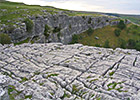Speeding up the naturally occurring process of weathering rocks to draw carbon dioxide out of the atmosphere could help to
 stabilize the climate and avert ocean acidification caused by greenhouse gas emissions, according to research published in the journal Nature Climate Change. As rainwater and other environmental conditions naturally break down rocks on the earth’s surface, carbon dioxide is drawn from the atmosphere. The process converts CO2 to bicarbonate, a mineral that chemically binds CO2 and is washed away through rivers to the oceans. By modeling the large-scale effects of weathering — which is driven largely by precipitation, vegetation, and soil microbes — the researchers found methods for accelerating this CO2-removal system. Such a strategy could significantly counteract anthropogenic fossil fuel emissions, they say, slowing ocean acidification and protecting delicate ocean ecosystems such as coral reefs.
stabilize the climate and avert ocean acidification caused by greenhouse gas emissions, according to research published in the journal Nature Climate Change. As rainwater and other environmental conditions naturally break down rocks on the earth’s surface, carbon dioxide is drawn from the atmosphere. The process converts CO2 to bicarbonate, a mineral that chemically binds CO2 and is washed away through rivers to the oceans. By modeling the large-scale effects of weathering — which is driven largely by precipitation, vegetation, and soil microbes — the researchers found methods for accelerating this CO2-removal system. Such a strategy could significantly counteract anthropogenic fossil fuel emissions, they say, slowing ocean acidification and protecting delicate ocean ecosystems such as coral reefs.

Weathered limestone cliffs in Yorkshire, England